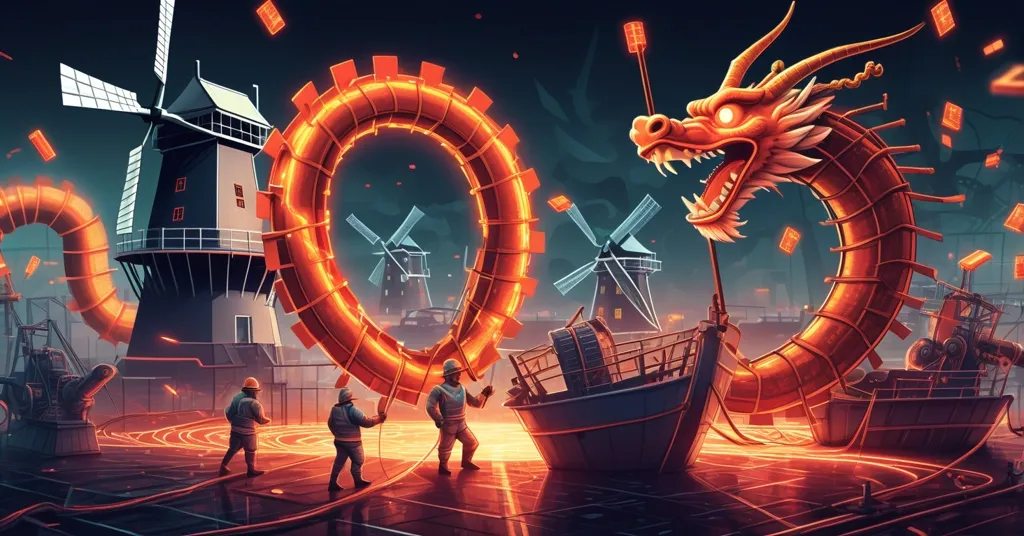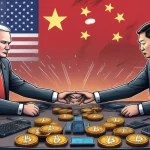Wingtech Warns: Dutch Nexperia Seizure Risks 2026 Profits and Crypto Mining Hardware

China’s Wingtech Sounds Alarm: Dutch Seizure of Nexperia Threatens 2026 Profits and Crypto Hardware
China’s Wingtech Technology has dropped a bombshell warning: if it can’t reclaim control of its semiconductor subsidiary Nexperia from the Dutch government by the end of 2025, expect a brutal hit to revenue, profits, and cash flow by 2026. This crisis, driven by U.S. sanctions and national security paranoia, isn’t just a corporate headache—it’s a geopolitical mess already rattling global supply chains, with the auto industry on edge and potential ripples reaching as far as Bitcoin mining hardware.
- Financial Fallout: Wingtech faces revenue, profit, and cash flow declines by 2026 without Nexperia control by late 2025.
- Dutch Power Grab: The Netherlands seized Nexperia in September 2024, bowing to U.S. fears of Chinese influence.
- Supply Chain Dominoes: Auto giants like Volkswagen could see chip shortages in weeks, with broader tech impacts looming, possibly even for crypto.
Background: A Controversial Takeover Unravels
Let’s set the stage. Wingtech, a Chinese tech firm based in Jiaxing, scooped up Nexperia, a semiconductor powerhouse, in 2019. From day one, this raised eyebrows in Europe. Dutch officials flagged it as a Chinese-controlled entity, fearing strategic tech falling into Beijing’s orbit. By late 2023, warnings about the ownership structure were sounding louder, and in 2024, the U.S. threw gasoline on the fire by slapping Wingtech onto its Entity List—a trade blacklist that cuts off dealings with American companies over security concerns. The final blow came in September 2024 when the Dutch government seized control of Nexperia, nudged by U.S. pressure and even demands to replace Nexperia’s Chinese CEO to avoid harsher sanctions. It’s a textbook case of geopolitics trumping business as usual.
Wingtech’s Financial Warning: A Ticking Clock
Despite the chaos, Wingtech isn’t drowning just yet. Its third-quarter earnings showed a robust 12.2% spike in semiconductor revenue compared to last year, proof of solid demand for chips. But the shadow of Nexperia’s seizure looms large. In its earnings report, Wingtech laid out the stakes with brutal clarity, warning of severe financial impacts as detailed in reports on Nexperia’s impact on profits and cash flow by 2026.
“If control of Nexperia cannot be restored before the end of 2025, the company may face temporary downward pressure on revenue, profit and cash flow.”
While exact figures on potential losses or Nexperia’s share of Wingtech’s revenue aren’t public, the message is clear: losing a key subsidiary for too long could kneecap their growth in a cutthroat market. Semiconductors aren’t just a business—they’re the backbone of modern tech, and Wingtech’s future hinges on regaining this asset.
Geopolitical Firestorm: U.S., China, and a Dutch Tightrope
This isn’t merely a corporate spat; it’s a full-blown geopolitical showdown. The U.S. views Chinese ownership of firms like Nexperia as a national security risk, fearing tech leaks or dual-use applications in military hardware. Adding Wingtech to the Entity List in 2024 was a deliberate move to choke off its access to American tech and markets. China, unsurprisingly, isn’t taking this lying down. Their Commerce Minister blasted the Dutch seizure as a gut punch to global stability, stating it “seriously affected global supply chain stability.” As a counterpunch, China rolled out fresh export restrictions on rare earths and critical materials—think neodymium and dysprosium, minerals vital for making chips and electric vehicle batteries. China dominates this supply, and their spokesperson Wang Wentao framed it coolly as a “normal effort to tighten its export control system.” Yeah, right. It’s a calculated jab in an escalating trade war.
Caught in the middle, the Netherlands is playing a high-stakes balancing act, juggling economic ties with China against security alignments with the U.S. The European Union is scrambling to broker peace, with trade commissioner Maros Sefcovic admitting they’re “in frequent contact” with Beijing and “fully aware the time is of the essence here.” But with both superpowers digging in, a tidy resolution feels like wishful thinking. This saga mirrors broader tech control battles—think Huawei bans or TikTok scrutiny—showing how governments are flexing muscle over global innovation, a trend that should make any decentralization advocate uneasy.
Auto Industry Fallout: Chip Crisis 2.0?
The immediate fallout is slamming the auto sector. Nexperia churns out power semiconductors—chips that manage energy flow in devices and vehicles—and supplies heavyweights like Volkswagen. Industry insiders are sounding alarms: supply disruptions could halt production lines within a single week, with wider chaos rippling through the market in just three. Remember the post-COVID chip shortages that stalled car manufacturing? This could be the ugly encore. The global supply chain is a house of cards, and yanking out a key player like Nexperia risks a collapse that could take months to untangle.
For the uninitiated, semiconductors are the tiny brains behind everything tech—your phone, your laptop, your car’s engine control unit. A shortage doesn’t just mean fewer gadgets; it grinds entire industries to a halt. And when a hub like the Netherlands, a semiconductor hotbed, gets snarled in political games, the pain goes global fast.
Could Semiconductor Shortages Hit Bitcoin Mining and Crypto?
Now, let’s pivot to why this matters to our crypto crew. At first glance, a semiconductor spat seems miles away from Bitcoin or Ethereum. But dig deeper, and the threads connect. Mining rigs—whether ASIC miners (specialized hardware for Bitcoin mining) or GPU rigs (versatile cards often used for altcoins like Ethereum before its Proof-of-Stake switch)—rely on chips. So do hardware wallets and the servers powering decentralized networks. If automakers are sweating over shortages, what happens when the ripple hits the niche but critical world of blockchain hardware?
History gives us clues. During the 2021 crypto boom, GPU prices skyrocketed as miners snatched up every card for Ethereum mining, compounded by pandemic-driven chip shortages. A repeat scenario with Nexperia’s output in limbo could jack up costs for new miners or small operations, slowing adoption. Imagine trying to snag a new Bitcoin rig in 2026 only to find prices tripled or shelves empty due to a Dutch-Chinese standoff. It’s not far-fetched.
Let’s play devil’s advocate, though. Crypto hardware demand is a drop in the bucket compared to consumer tech or autos—shortages might not sting as hard here. Big players like Bitmain could stockpile or pivot to alternative suppliers. Still, accessibility for newcomers or smaller miners could take a hit, and in a space built on democratizing finance, that’s a problem. Plus, the broader theme—governments seizing control of tech infrastructure—should have every decentralization fan on edge. If a chip firm can be nabbed over “security concerns,” what’s stopping a crackdown on crypto nodes or mining farms next?
Counterpoints: Why the West Pushed Back
Before we paint this as a pure overreach, let’s chew on the other side. The U.S. and Dutch concerns aren’t baseless paranoia. Chinese ownership of critical tech raises legit fears—think potential data leaks, backdoors in hardware, or semiconductors quietly fueling military tech. Nexperia’s chips aren’t just in cars; they’re in systems where security is non-negotiable. The West argues this isn’t about stifling trade but safeguarding sovereignty in a world where tech is the ultimate weapon. China’s track record on intellectual property and state influence over firms like Wingtech doesn’t help its case. Still, their counterargument—that this disrupts global stability—holds weight when supply chains are already fragile. It’s a messy stalemate with no easy villain.
What’s Next? A Resolution or Escalation?
Peering ahead, outcomes range from diplomatic détente to all-out trade war. If the EU and Netherlands broker a deal with Beijing—say, restructuring Nexperia’s ownership to ease security fears—disruptions might ease by mid-2025. But if U.S.-China tensions boil over, with more sanctions and export curbs, we’re looking at a prolonged chip crisis that could bleed into every tech sector, crypto included. Wingtech’s fight is just one skirmish in a larger battle over who controls tomorrow’s tech. For us in the blockchain space, it’s a stark reminder: decentralization isn’t just about finance—it’s about breaking free from centralized supply chains and political whims.
Key Questions and Takeaways
- What sparked the Dutch seizure of Nexperia in 2024?
The Netherlands took control in September 2024 due to U.S. pressure over national security risks from Wingtech’s Chinese ownership, fueled by Wingtech’s addition to the U.S. Entity List. - How might Wingtech suffer financially by 2026?
Wingtech predicts drops in revenue, profit, and cash flow by 2026 if it can’t reclaim Nexperia by the end of 2025, risking its semiconductor market position. - Why is the auto industry bracing for impact?
Nexperia supplies critical chips to firms like Volkswagen, and shortages could halt production within weeks, mirroring past post-COVID disruptions. - Could this chip crisis affect Bitcoin and crypto mining?
Potentially, as prolonged shortages might limit ASIC miners and GPU rigs for blockchain networks, driving up costs and hindering new miners, though larger players may adapt. - How do geopolitical tensions fuel this standoff?
U.S.-China rivalry over tech dominance is the core issue, with China retaliating via rare earth export curbs while the EU and Netherlands push for a diplomatic fix. - Will diplomacy avert a broader supply chain collapse?
EU efforts are underway, but escalating trade retaliations between the U.S. and China make a swift resolution unlikely, risking deeper tech and crypto hardware disruptions.
This Nexperia mess is a wake-up call. Our tech-driven world is perilously fragile, and national interests can steamroll corporate ones overnight. For the crypto community, it’s a nudge to double down on decentralization—not just in money, but in the very hardware that keeps our networks alive. Governments playing chess with semiconductors should ignite urgency among anyone who values freedom and autonomy. Wingtech’s battle is a front-row seat to the war over tech’s future. And if you think Bitcoin’s price swings are wild, wait until a chip drought stalls the next bull run. Stay vigilant—this game’s only getting dirtier.



